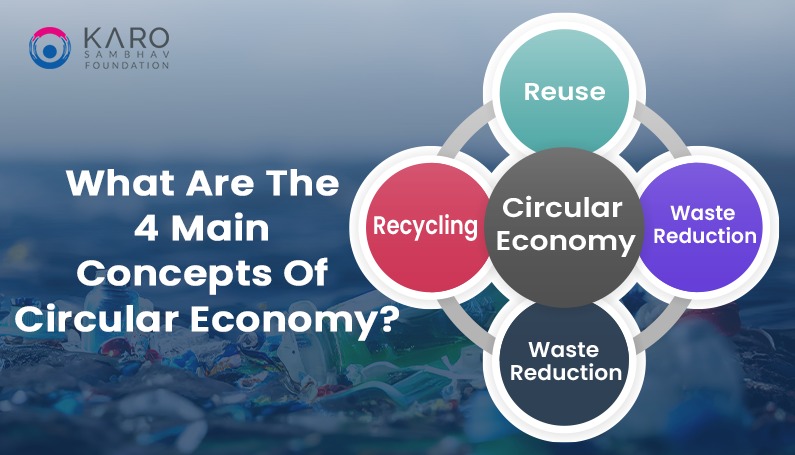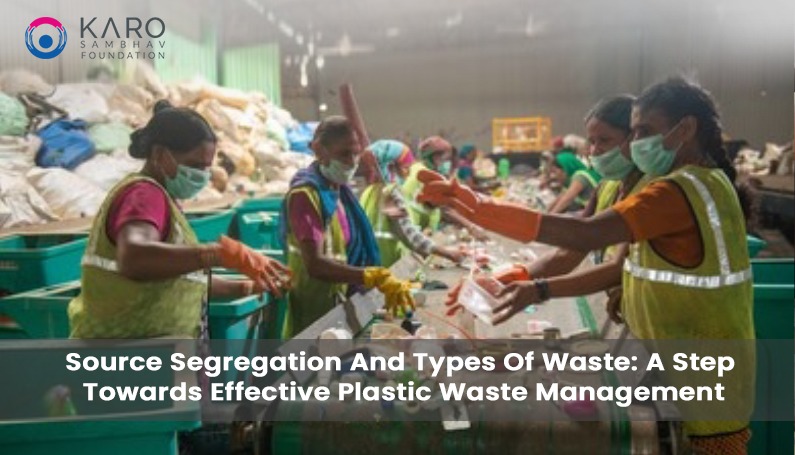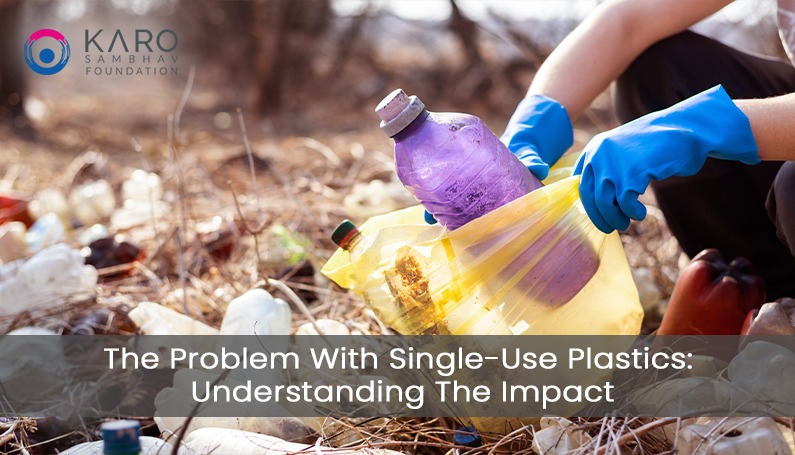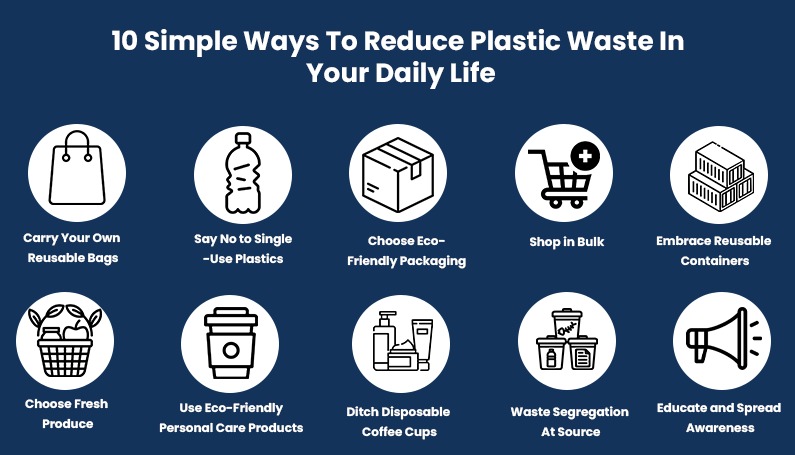July 14, 2023
What Are The 4 Main Concepts Of Circular Economy?What Are The 4 Main Concepts Of Circular Economy?
- July 14, 2023
- /
- By Karo Sambhav Foundation
- Plastic Waste Management
- Plastic Waste Management in India
- Plastic Waste
- Reuse and Recycling

In today's world, when environmental concerns are growing more pressing, the need to move away from a linear economy and towards a circular economy is a need and not just a favourable concept anymore. Businesses, organisations, and individuals are actively exploring sustainable solutions as concerns about resource depletion and environmental degradation. In this article, we'll look at the four basic principles of a circular economy including reuse and recycling, and how they apply to plastic waste management. We will explore the practical applications and countless benefits of adopting a circular economy perspective, with a special focus on the work of the Karo Sambhav Foundation (KSF), a prominent organisation committed to enabling a circular economy in India.
Understanding and applying fundamental ideas such as reuse and recycling, as well as waste reduction and product redesign, can pave the way for a more sustainable, resilient, and waste-free future. By embracing better and more consciously designed systems, we can jointly contribute to the preservation of our planet and a brighter future for future generations.
The 4 Main Concepts Of Circular Economy
The circular economy is a paradigm shift aimed at redefining our existing linear consumption and manufacturing patterns. Its guiding ideas are to reduce waste, increase resource efficiency, and promote responsible consumption. We can establish a regenerative and sustainable system by adopting a circular economy attitude that conserves resources, reduces waste, and reduces environmental impact. We can develop a future that prioritises sustainability and aims for a healthy link between economic growth and environmental stewardship by employing creative ways such as waste reduction, product redesign, designing for reuse, and responsible recycling. Adopting these ideas lays the path for a more affluent and resilient future for future generations. The four key ideas of the circular economy are as follows:
Concept 1: Reuse - Extending Product Life Cycles
The notion of reuse is a major pillar of the circular economy. Rather of abandoning things after a single use, this notion promotes their reuse via repair, refurbishing, and sharing. We may minimise the use of raw materials and the energy necessary to manufacture new items by using reuse solutions. With an emphasis on plastic waste management, Karo Sambhav Foundation actively encourages programs that encourage reuse and recycling. KSF supports individuals and businesses to repair and repurpose objects through campaigns and collaborations, reducing waste output and preserving resources.
Concept 2: Recycling - Closing the Loop
Recycling is one of the most essential pillars of a circular economy. It entails transforming waste materials into new products, thereby closing the production-consumption-disposal cycle. Recycling aids in the conservation of resources by reducing the dependency on virgin material, the reduction of landfill trash, and the reduction of the environmental effect of resource exploitation. Karo Sambhav Foundation is an important advocate for recycling, notably in the space of plastic waste management. KSF works with stakeholders across the value chain to develop collection points, streamline sorting procedures, and build a strong recycling infrastructure. KSF strives to increase recycling rates, avoid plastic pollution, and establish a circular economy for plastic waste by raising awareness and offering accessible collection mechanisms to aid recycling.
Concept 3: Waste Reduction - Designing for Efficiency
Waste reduction is a proactive strategy for reducing waste output from the start. It entails developing goods and procedures with the purpose of generating less waste. Companies may maximise resource usage, decrease packaging waste, and increase durability by implementing eco-design concepts. The Karo Sambhav Foundation understands the value of waste reduction in building a circular economy. KSF supports businesses and customers to embrace sustainable practices such as utilising minimum packaging, choosing for reusable alternatives, and adopting responsible consumerism through educational programs and collaborations.
Concept 4: Product Redesign - Rethinking the System
Product redesign is a game changer in the circular economy, challenging old linear manufacturing strategies. Companies may produce more sustainable and recyclable products by rethinking product design, materials, and packaging. This trend towards eco-design makes it easier to repair, disassemble, and recycle things at the end of their lives.
Conclusion
The concepts highlighted above, create a solid framework for sustainable resource management and waste reduction. Karo Sambhav Foundation (KSF), as part of its commitment to plastic waste management, actively promotes and advocates for reuse and recycling along with waste reduction. We may move away from the linear "take-make-dispose" model and towards a more sustainable and regenerative approach by adopting a circular economy perspective. Furthermore, adopting these principles not only improves the environment by decreasing resource consumption and waste generation, but it also generates economic possibilities, such as the growth of reuse and recycling companies and the birth of creative solutions. Let us join forces with the Karo Sambhav Foundation to adopt circular economy concepts in order to construct a greener and more prosperous future for ourselves and future generations. Together, we can make a significant difference on the path to sustainability.
Recent Posts



